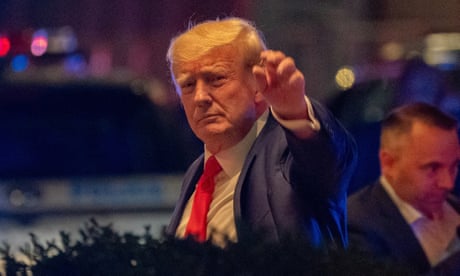Galloping Grant: the day a sitting president of the US was arrested
President Ulysses S Grant’s penchant for speeding in his horse-drawn carriage landed him in trouble with police in 1872
Martin Pengelly
Donald Trump may be preparing to become the first US president to be criminally indicted but should his perp walk for paying hush money to a porn star come to pass – perhaps granting his reported wish to be seen handcuffed – he will not be the first president ever arrested.

Trump wants to be handcuffed for court appearance in Stormy Daniels case, sources say
In 1872, President Ulysses S Grant was nicked for speeding in his horse-drawn carriage.
The arrest of the 18th president, at the corner of 13th and M streets in Washington DC, was not for “a high crime, but it was – at least theoretically speaking – a misdemeanor”, the Washington Post reported.
Grant became president in 1869, four years after leading the Union armies to victory over the Confederacy in the civil war, the conflict which ended slavery in the US.
The policeman who arrested Grant was a Black civil war veteran, William H West. In 1908, West told his tale to the Washington Evening Star.
From his days as a cadet at the United States Military Academy, Grant was known as an excellent horseman.
Even as president, the Star said, he “loved nothing better than to sit behind a pair of spirited animals. He was a good driver, and sometimes ‘let them out’ to try their mettle.”
When he was stopped by West, the Star said, Grant “was driving a pair of fast steppers and he had some difficulty in halting them, but this he managed to do”.
The president asked: “Well, officer. What do you want with me?”
West said: “I want to inform you, Mr President, that you are violating the law by speeding along this street. Your fast driving, sir, has set the example for a lot of other gentlemen.”
Grant said sorry and left. The next day, however, he did it again.
According to the Star, Grant smiled like “a schoolboy who had been caught in a guilty act by a teacher” and said he had not been aware he was traveling too fast.
West said: “I am very sorry, Mr President, to have to do it, for you are the chief of the nation, and I am nothing but a policeman, but duty is duty, sir, and I will have to place you under arrest.”
Grant was taken to a police station and ordered to pay $20. A trial was held the next day, with numerous cases against speeding drivers “contested bitterly”. A judge issued heavy fines and a “scathing rebuke”.
Grant, however, did not show up.
The Post noted it was not possible to check the story. But it also pointed to comments from 2012 in which Cathy Lanier, then DC police chief, called Grant a joy rider.
“He actually was racing his buggy on M street,” Lanier said. “… We seized his horse and buggy.”
Lanier also said DC police “actually stopped and cited Ulysses S Grant three times for speeding” but “ended up letting him pay a fine and walk back to the White House”.
I hope you appreciated this article. Before you move on, I was hoping you would consider taking the step of supporting the Guardian’s journalism.
From Elon Musk to Rupert Murdoch, a small number of billionaire owners have a powerful hold on so much of the information that reaches the public about what’s happening in the world. The Guardian is different. We have no billionaire owner or shareholders to consider. Our journalism is produced to serve the public interest – not profit motives.
And we avoid the trap that befalls much US media – the tendency, born of a desire to please all sides, to engage in false equivalence in the name of neutrality. While fairness guides everything we do, we know there is a right and a wrong position in the fight against racism and for reproductive justice. When we report on issues like the climate crisis, we’re not afraid to name who is responsible. And as a global news organization, we’re able to provide a fresh, outsider perspective on US politics – one so often missing from the insular American media bubble.
Around the world, readers can access the Guardian’s paywall-free journalism because of our unique reader-supported model. That’s because of people like you. Our readers keep us independent, beholden to no outside influence and accessible to everyone – whether they can afford to pay for news, or not.
No comments:
Post a Comment